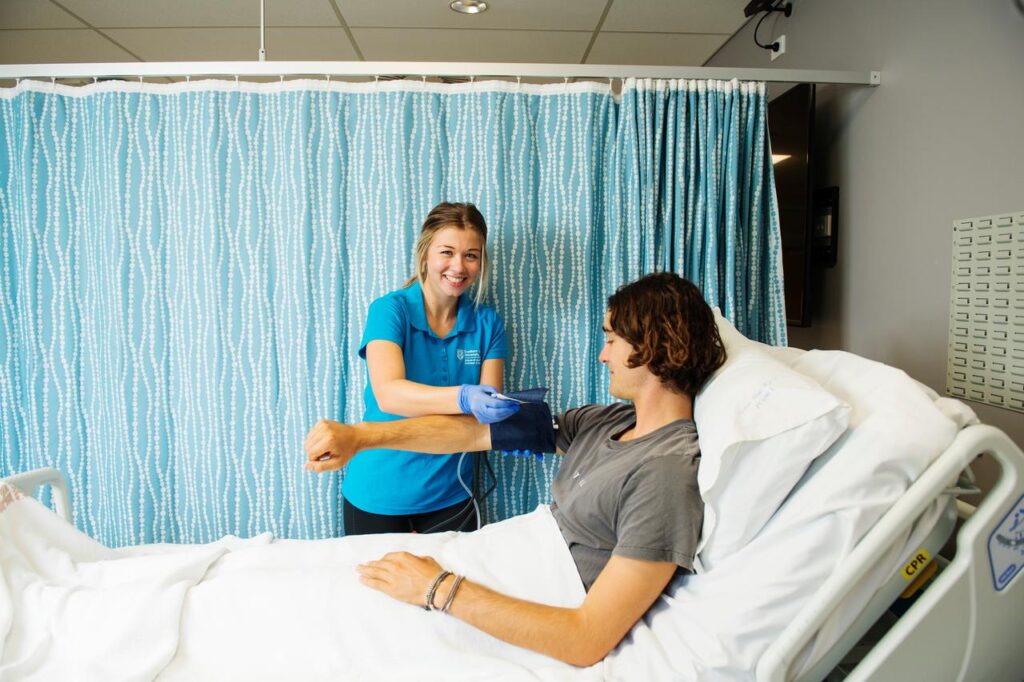As Sydney residents, we understand the importance of maintaining good health and well-being. One aspect of our overall health that often gets overlooked is sleep. A good night’s sleep is essential for our physical and mental well-being, yet many of us struggle with sleep-related issues. Sleep tests are a valuable tool in helping us understand and address these issues, and this article will guide you through the essentials of sleep tests. So, let’s dive in and explore the world of sleep tests.
Understanding the Importance of Sleep Tests
Sleep plays a critical role in our overall health and well-being. It is during sleep that our bodies repair and rejuvenate themselves. Lack of quality sleep can lead to various health issues, including fatigue, mood swings, difficulty concentrating, and even chronic conditions like heart disease and diabetes. By undergoing a sleep test, we can gain valuable insights into our sleep patterns and identify any underlying sleep disorders that may be affecting our overall health.
The Role of Sleep in Overall Health
Before we delve into the specifics of sleep tests, let’s take a moment to understand the significance of sleep for our overall health. During sleep, our body goes through various stages and cycles, each serving a unique purpose. These stages include light sleep, deep sleep, and REM (rapid eye movement) sleep. Each stage plays a crucial role in restoring our body and mind, ensuring that we wake up feeling refreshed and ready to take on the day.
During light sleep, our body relaxes and prepares for the deeper stages of sleep. It is during deep sleep that our body repairs tissues, stimulates growth and development, and boosts our immune system. Deep sleep is also essential for memory consolidation, helping us retain and process information. Finally, REM sleep is when we experience vivid dreams and our brain becomes highly active. This stage is crucial for cognitive function, emotional regulation, and learning.

Why Sleep Tests are Necessary
Sleep tests are necessary for several reasons. Firstly, they help us identify any sleep disorders that may be interfering with our sleep quality. Common sleep disorders include sleep apnea, insomnia, restless legs syndrome, and narcolepsy. By diagnosing these disorders, we can seek appropriate treatment and improve our sleep quality. Additionally, sleep tests can provide valuable data and insights for healthcare professionals to develop personalized treatment plans tailored to our specific needs.
During a sleep test, various parameters are monitored to assess our sleep quality. These parameters may include brain activity (measured through electroencephalography), eye movements (measured through electrooculography), muscle tone, heart rate, and breathing patterns. By analyzing this data, sleep specialists can identify any irregularities or abnormalities that may be affecting our sleep. This information is crucial for determining the most effective treatment options, which may include lifestyle changes, medication, or the use of devices such as continuous positive airway pressure (CPAP) machines for sleep apnea.
Different Types of Sleep Tests
Now that we understand the importance of sleep tests, let’s explore the different types available to Sydney residents.
Read about medicare sleep apnea test at: How Medicare Covers Sleep Apnea Tests
Polysomnography: An In-depth Look
Polysomnography, also known as a sleep study, is a comprehensive sleep test that monitors various physiological parameters during sleep. These include brain waves, eye movements, muscle activity, heart rate, and breathing patterns. A polysomnography test is typically conducted overnight in a specialized sleep clinic or hospital setting, where trained professionals monitor the data in real-time. This test provides detailed information about sleep stages, breathing abnormalities, and other factors that may affect sleep quality.
During a polysomnography test, electrodes are placed on the scalp to record brain wave activity, while sensors on the face monitor eye movements. Straps around the chest and abdomen track muscle activity and breathing patterns, and a pulse oximeter on the finger measures blood oxygen levels. This comprehensive approach allows healthcare providers to assess the quality of sleep and identify any potential sleep disorders accurately.
Home Sleep Tests: Convenience and Comfort
For those who prefer the comfort and convenience of their own homes, home sleep tests are a great option. These tests involve wearing a portable monitoring device that records essential sleep parameters, such as breathing patterns and blood oxygen levels. Home sleep tests are typically recommended for individuals suspected to have sleep apnea, as it is a reliable and cost-effective way to diagnose this common sleep disorder. It offers the flexibility of conducting the test in your own bed while still providing accurate results.
The portable monitoring device used in home sleep tests is user-friendly and comfortable to wear during the night. It is equipped with sensors that track breathing pauses, snoring intensity, and oxygen saturation levels, providing valuable data for healthcare professionals to analyze. Despite being conducted outside a clinical setting, home sleep tests adhere to strict guidelines to ensure accuracy and reliability in diagnosing sleep disorders. Read more about valuable data on https://studyonline.unsw.edu.au/blog/types-of-data
Preparing for a Sleep Test
Once you have decided to undergo a sleep test, it is essential to prepare yourself adequately for the examination. Here are some tips to help you prepare:
Before heading to the sleep clinic or hospital for your sleep test, it can be beneficial to familiarize yourself with what to expect during the examination. In addition to the practical tips provided, understanding the process can help alleviate any anxiety you may have about the test.
What to Expect During the Test
- Arrive at the sleep clinic or hospital at the scheduled time.
- Prepare to spend the night in a comfortable sleep environment.
- Be prepared to have sensors attached to various parts of your body to monitor different physiological parameters.
- Try to relax and maintain your usual pre-sleep routine as much as possible.
During the sleep test, trained professionals will monitor your sleep patterns, breathing, and other vital signs to assess your overall sleep quality and identify any potential sleep disorders. The data collected from the sensors will provide valuable insights into your sleep habits and help healthcare providers make an accurate diagnosis.
Tips for a Successful Sleep Test
- Avoid consuming caffeine or alcohol before the test, as they can interfere with sleep patterns.
- Follow any specific instructions provided by the sleep clinic regarding medication or dietary restrictions.
- Bring any comfort items, such as pajamas, pillows, or a favorite blanket, to help make the sleep environment more familiar.
- Try to get a good night’s sleep leading up to the test to ensure that you are well-rested.
By following these tips and being prepared for what to expect during the sleep test, you can maximize the effectiveness of the examination and increase the likelihood of obtaining accurate results. Remember, the goal of the sleep test is to help improve your overall sleep quality and address any underlying issues that may be affecting your restfulness.
Interpreting Sleep Test Results
Once the sleep test is complete, the data collected will be analyzed by sleep specialists. Here’s what they will be looking for:
After the sleep specialists have collected and analyzed the data from your sleep test, they will delve into a detailed examination of your sleep stages and cycles. Understanding the intricacies of sleep stages and cycles is crucial in interpreting sleep test results. By meticulously scrutinizing the time spent in each stage, these specialists can pinpoint any irregularities or disruptions that may be present. This meticulous analysis plays a pivotal role in identifying potential sleep-related disorders and formulating tailored treatment plans to address them effectively. To find more about irregularities click here.

Understanding Sleep Stages and Cycles
Sleep stages and cycles are an essential part of interpreting sleep test results. Sleep specialists will analyze the time spent in each stage, looking for any abnormalities or disturbances. This information can help identify sleep-related disorders and guide appropriate treatment options.
Furthermore, the examination of sleep stages and cycles provides valuable insights into the quality of your sleep and overall sleep architecture. By assessing the transitions between different stages and the duration of each cycle, specialists can gain a comprehensive understanding of your sleep patterns. This comprehensive evaluation aids in determining the efficiency of your sleep, potential factors affecting its quality, and areas that may require intervention to enhance your overall sleep health.
Identifying Sleep Disorders from Test Results
The primary goal of a sleep test is to identify any sleep disorders that may be impacting your sleep quality. Sleep specialists will analyze various parameters, such as breathing patterns, heart rate, and brain activity, to determine if any abnormalities exist. Based on these findings, they will be able to provide an accurate diagnosis and recommend appropriate treatment options.
Moreover, the meticulous scrutiny of test results goes beyond a mere identification of sleep disorders. It involves a comprehensive assessment of the interplay between different physiological functions during sleep. By examining factors like oxygen saturation levels, muscle activity, and movement patterns, specialists can uncover subtle indicators that may point towards specific sleep disorders. This holistic approach enables them to offer personalized insights into your sleep health and devise targeted strategies to address any underlying issues, ultimately paving the way for improved sleep quality and overall well-being.
Sleep Clinics and Hospitals in Sydney
If you’re considering undergoing a sleep test in Sydney, it’s important to choose the right sleep clinic or hospital. Here are some factors to consider:
Choosing the Right Sleep Clinic
- Look for clinics that specialize in sleep medicine and have experienced sleep specialists on staff.
- Consider the location and accessibility of the clinic.
- Read reviews or seek recommendations from trusted sources.
- Ensure that the clinic offers the specific type of sleep test you require.
What to Expect in Sydney Sleep Clinics
Sleep clinics in Sydney provide a comfortable and conducive environment for sleep tests. You can expect state-of-the-art equipment, experienced healthcare professionals, and personalized care at these clinics. The staff will ensure that you are well-informed and supported throughout the entire testing process.
By understanding the importance of sleep tests, the types available, and how to prepare for them, Sydney residents can take proactive steps towards improving their sleep quality and overall health. Remember, a good night’s sleep is essential for a healthy and fulfilling life.
Furthermore, many sleep clinics in Sydney offer comprehensive follow-up services to help patients interpret their sleep study results and develop personalized treatment plans. These services may include consultations with sleep specialists, recommendations for lifestyle changes, and guidance on using continuous positive airway pressure (CPAP) machines for conditions like sleep apnea.
Benefits of Choosing a Specialized Sleep Clinic
Opting for a specialized sleep clinic in Sydney can provide additional benefits beyond just conducting sleep tests. These clinics often have access to cutting-edge research and treatment options, as well as support groups for patients dealing with sleep disorders. Additionally, the focused expertise of staff members in a specialized clinic can lead to more accurate diagnoses and tailored treatment plans for individuals with complex sleep issues.

